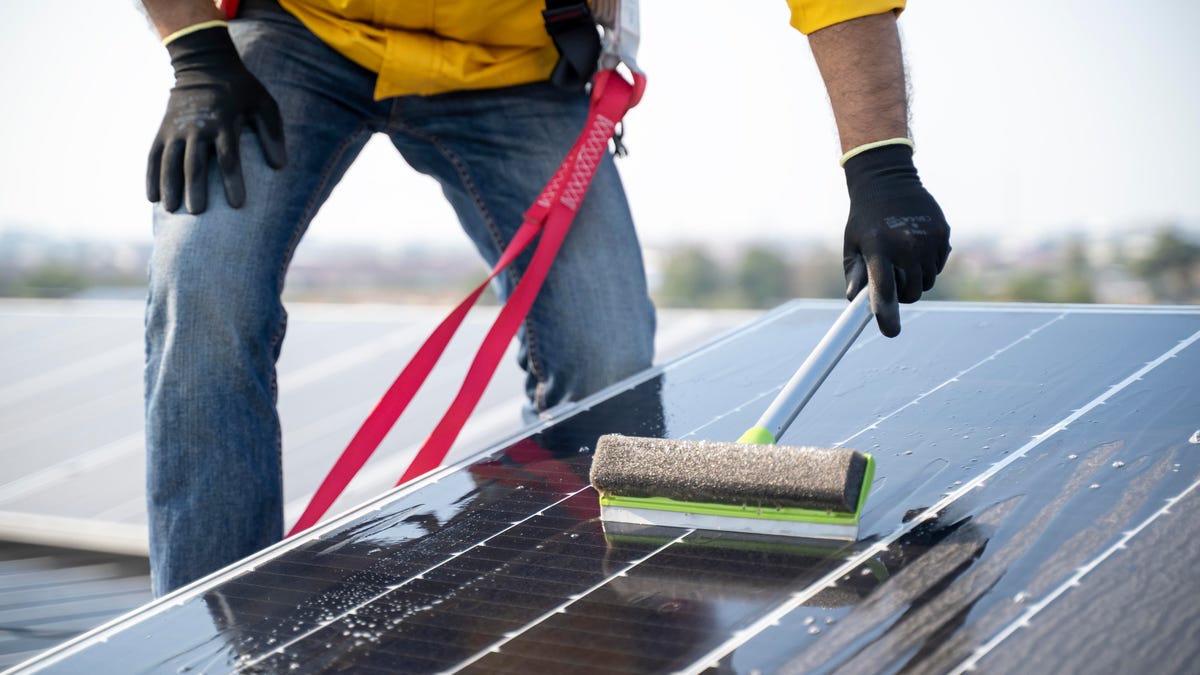The Rooftop Solar Industry Is Struggling, but It Isn't Collapsing
Experts say the dip in residential solar installations is only temporary. Here's where the industry stands and where it's going.

The solar industry is contracting in 2024.
The solar industry is chock full of contradictions right now. For all the good news -- big federal incentives and ever-increasing interest in renewable energy -- there's also been some not-so-great news, with some solar installers slashing jobs or closing down entirely.
It's led some to openly wonder: Is the residential solar industry going down? Well, not quite.
"I would not say that we're expecting a collapse in the residential solar industry," said Zöe Gaston, principal analyst at Wood Mackenzie, a data analytics firm. "We are expecting a contraction."
Can solar panels save you money?
Interested in understanding the impact solar can have on your home? Enter some basic information below, and we’ll instantly provide a free estimate of your energy savings.
There are a few different reasons for that, but they all portend a slightly slower year for solar in 2024 than we had in 2023, with a likely recovery in 2025.
Here's what you need to know about the state of the solar industry right now.
Why is the solar industry in rough shape?
Let's get one thing clear: While the solar industry isn't collapsing, it isn't at its peak.
"It definitely is a tough time for the residential solar market," Gaston said.
Gilbert Michaud, assistant professor of environmental policy at the School of Environmental Sustainability at Loyola University Chicago, sees this moment as a natural part of a cycle for an industry that has endured many ups and downs.
"The market is in a more mature stage than it was 10 or 20 years ago," he said.
Wood Mackenzie is predicting a 13% contraction in the residential solar market this year compared to last year. But Gaston says it's also expecting a rebound in 2025.
Here are the factors driving that prediction for 2024.
- High interest rates: Gaston said this is the biggest factor hurting solar right now. The high interest rates of the post-pandemic economic recovery make it harder for solar companies to get the capital they need to run and expand their businesses. Plus, those higher rates increase the cost of solar financing for consumers, making it a harder sell.
- Slight uptick in material costs: The cost of solar panels has fallen dramatically over the past decade, but prices have started to tick back up lately, according to Michaud. "Everything has bumped up a little bit," he said.
- Lower consumer demand: Installers began reporting sales declines about a year ago, Gaston said, but with a lag time from sales to installation, solar companies are now starting to feel the pain of that decline more acutely. "That sales decline started to impact installation volumes last year," Gaston said, adding that the situation has only continued in 2024.
- Big changes in California: Last year, the state of California -- the country's largest solar market -- instituted big changes to its solar net-metering policy, which made solar a lot less lucrative for homeowners. There was a big rush of installations before the policy went into effect, but installation volumes have since dropped off. Gaston said 2024 could see a 40% decline in California's solar market, a major factor contributing to the nationwide decline.
Why things aren't as bad as they seem
Gaston and Michaud see plenty of reasons for hope in the solar industry.
For one thing, interest rates are expected to finally come down this year, which would give a boost to solar sales and installations going into next year. Wood Mackenzie is predicting 13% growth in residential solar in 2025.
It's also taking some time to see the benefits of the Inflation Reduction Act, which showered big financial incentives on the solar industry, according to Gaston and Michaud. "That's a huge benefit, but the timing of it … the headwinds with interest rates are outweighing that," Gaston explained. By 2025, the IRA could give a more visible boost to solar sales. "There's kind of this lag for policy," Michaud said. "You've got to give it a year or two to see the fruits of that."
There's also the indirect benefit of rising retail electricity rates in some states, which often leads more homeowners to look into solar as a way of saving money. "Some states may see quite a bit of growth this year," Gaston said.
Taken together, Gaston and Michaud see 2024 as a bump in the road for the solar market, rather than an existential crisis.
"There's still so much potential for residential solar, I think interest rates are just causing a temporary slow down," Gaston said.
Is now a bad time to buy solar panels?
It might be a bit of a slow period for the solar industry, but that doesn't mean you should delay a solar installation on your own home.
"If you're a homeowner and you're thinking about this, I'd still try to get in there now and act sooner or later," Michaud said.
While it's possible that solar costs go back down next year with lower interest rates, there's a bit of uncertainty surrounding the presidential election, Michaud said. Some worry that a new administration could alter or reduce the available solar incentives.
"Do it now, if you're interested," Michaud said.



